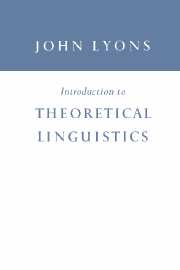Book contents
- Frontmatter
- Contents
- PREFACE TO THE 1995 EDITION
- 1 Linguistics: The Scientific Study of Language
- 2 The Structure of Language
- 3 The Sounds of Language
- 4 Grammar: General Principles
- 5 Grammatical Units
- 6 Grammatical Structure
- 7 Grammatical Categories
- 8 Grammatical Functions
- 9 Semantics: General Principles
- 10 Semantic Structure
- Notes and references
- Addenda
- Bibliography
- Table of symbols and notational conventions
- Index of proper names
- Index of subjects
- Frontmatter
- Contents
- PREFACE TO THE 1995 EDITION
- 1 Linguistics: The Scientific Study of Language
- 2 The Structure of Language
- 3 The Sounds of Language
- 4 Grammar: General Principles
- 5 Grammatical Units
- 6 Grammatical Structure
- 7 Grammatical Categories
- 8 Grammatical Functions
- 9 Semantics: General Principles
- 10 Semantic Structure
- Notes and references
- Addenda
- Bibliography
- Table of symbols and notational conventions
- Index of proper names
- Index of subjects
Summary
Subject, predicate and adjunct
Nuclear and extranuclear constituents
It is a fundamental principle of traditional grammar, and also of much modern syntactic theory, that every simple, declarative sentence consists of two obligatory major constituents, a subject and a predicate; and that it may contain, in addition, one or more adjuncts. Adjuncts (of place, time, manner, reason, etc.: we shall come back later to the various kinds of adjuncts) are optional, or structurally dispensable, constituents of the sentence: they may be removed without affecting the remainder of the sentence.
To illustrate the way in which these terms are applied, we may refer to the sentence John killed Bill in Central Park on Sunday. The subject is John; the predicate is killed Bill; and in Central Park and on Sunday are adjuncts, of place and time respectively. Either or both of the adjuncts may be omitted without destroying the grammaticality of the sentence: John killed Bill on Sunday, John killed Bill in Central Park, John killed Bill. By contrast, neither *killed Bill in Central Park on Sunday nor *John in Central Park on Sunday are grammatically complete sentences (for the notion of ‘incomplete’ sentences, cf. 5.2.3). We will say that the subject and predicate together form the nucleus of the sentence. The subject and the predicate are therefore nuclear, and adjuncts extranuclear, constituents.
Topic and comment
It has already been mentioned that, from the time of Plato onward, the definition of the noun and the verb has been closely associated with the distinction of subject and predicate (cf. 1.2.5, 7.6.4).
- Type
- Chapter
- Information
- Introduction to Theoretical Linguistics , pp. 334 - 399Publisher: Cambridge University PressPrint publication year: 1968

